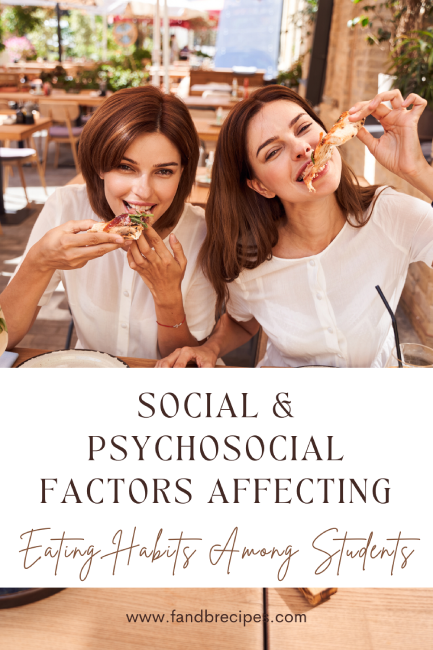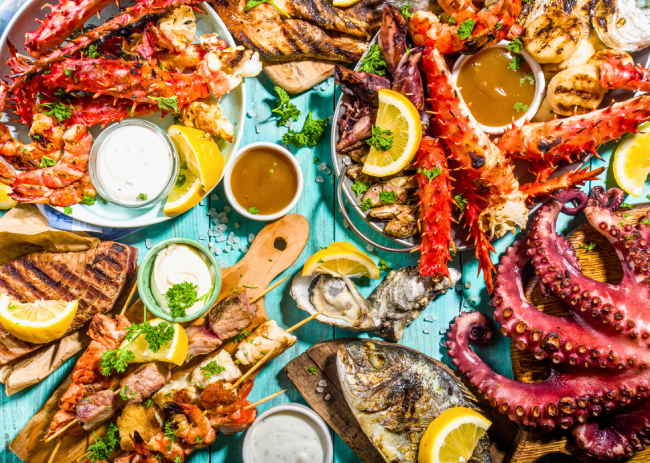Social and Psychosocial Factors Affecting Eating Habits Among Students
Eating a healthy diet every day can be hard for students. They are often exposed to different things at college that can change the way they eat. In this article, the complicated connection between social and psychosocial factors and what students eat is looked at. This shows how hard it is to balance college, social pressures, and personal health.
Students’ Life: A Balancing Act
Academic Stress and Time Management
Academic stress and the need to manage time efficiently can result in neglecting proper meals. Students may skip meals, resorting to fast food for convenience, impacting their nutritional intake.
Academic worry is a normal part of being a student, and managing your time well is essential for dealing with it. Students often have to do a lot of things at once because they are trying to balance homework, tests, and social life. One positive aspect that can significantly alleviate this academic stress is the availability of services like https://papersowl.com/essays-for-sale online. For students who are trying to keep their mental health in good shape, these programs can be lifesavers. They offer professionally studied and written essays that help students learn and find answers. Students can better manage their time, feel less stressed, and spend more time taking care of themselves by using these kinds of services. This will eventually lead to a healthier and more balanced student life.
Financial Constraints
Financial constraints can limit students’ access to healthier food options. Many students are on tight budgets and often opt for inexpensive, but less nutritious, meal choices.
The Influence of Social Factors on Students’ Eating Habits
Impact of Peer Pressure
Peer pressure plays a significant role in shaping students’ eating habits. The desire to fit in with peers can lead to unhealthy choices. Fast food outings and late-night pizza runs are common examples of how peer influence can negatively impact diet.
Cultural and Family Influences
Cultural and family influences are also instrumental in determining dietary preferences. Changing the usual diet can become a problem. Students who are used to traditional dishes may need help. Furthermore, family traditions and habits can be hard to break, affecting what and how students eat.
Psychosocial Factors and Eating Habits
Stress and Emotional Eating
Stress is a constant companion for students, and it can lead to emotional eating as a coping mechanism. The pressure of exams, assignments, and deadlines can trigger cravings for comfort food, often high in sugar and fats.
Body Image and Self-Esteem
Psychosocial factors like body image and self-esteem can influence eating habits. Students striving for a certain body image may adopt extreme dieting practices. On the other hand, low self-esteem may lead to overeating and poor food choices.
The Role of Awareness and Education
Nutrition Education Programs
Offering nutrition education programs in colleges is a key way for education to help students develop healthy eating habits. These programs can teach students how to make smart food choices and make more people aware of how important balanced diets are.
Supportive Campus Environment
Creating a supportive campus environment is crucial. This includes offering a variety of healthy food options on campus, making it easier for students to choose nutritious meals.
Strategies to Improve Students’ Eating Habits
Meal Planning and Preparation
Especially for students, planning and making meals ahead of time are important parts of eating well. Making plans for meals ahead of time not only saves time but also helps students choose healthier foods. This lets them carefully choose what they eat, making sure they get all the nutrients they need.
The right nutrition plan is a complex process. It includes creating a menu, considering dietary preferences and much more. This process gives kids the tools they need to eat foods from different food groups. Additionally, making meals can be a fun and educational activity where students learn how to cook and try out new recipes.
Healthy Snacking
Snacking on healthy foods is an important part of keeping kids healthy and full of energy. Students often need quick and easy snacks in the breaks between classes, study sessions, or events outside of college. Making smart choices when they are eating can have a big effect on their health.
When you want to snack healthily, you should choose foods that are high in nutrients over those that are high in empty calories, sugar, or fat. Some healthy choices are nuts, seeds, fresh veggies, yoghurt, and whole-grain crackers. These snacks give you fiber, vitamins, and minerals that your body needs, which keeps you energized and helps you focus.
The Importance of Social Support
Friends and Social Networks
Positive social networks can encourage healthier eating habits. Supportive friends who share an interest in nutritious eating can motivate one another.
Professional Help
For students facing more severe dietary issues or struggling with emotional eating, seeking professional help, such as counselling, is essential.
In Conclusion
To sum up, students’ eating habits are affected by a lot of different social and psychological factors. Peer pressure, cultural influences, stress, and not having enough money can all make people choose unhealthy foods. However, education and support systems can help students make better choices. Students can eat a healthy, balanced diet if they are aware of these factors and take steps to deal with them.
Mary Spears is a registered dietitian and certified nutritionist. She received her BS in Nutrition and Dietetics a few months back. Mary is passionate about cooking and eating healthy.




